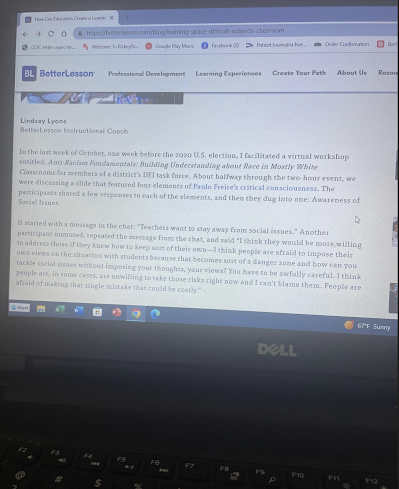November 11, 2022
We write this article in an attempt to analyze the purpose and consequence of Dothan City Schools Equity Plan of Action.
What was the purpose of this Equity Plan of Action? (https://www.dothan.k12.al.us/domain/2031)
Section 1: Culture of Academic Equity
Our data reflects that 40% of our student population identified as white are outperforming the slightly more than 60% of nonwhite students by a margin of 45% (2018) & 42% (2019) difference in Math and 45% (2018) & 45% (2019) in Reading. This trend reflects a gap in achievement over two years of data (2018 & 2019).
One might look at the number of students who are unable to read on the 3rd grade level in Dothan City Schools and assume that the administration would focus on the curriculum. No. The DCS Culturally Inspired Expertise Professional Learning Community Team Members focused on an equity action plan to convert attitudes and beliefs using multicultural, social justice, and culturally responsive teaching. This is their gateway into the minds and hearts of our children, their justification for SEL (Social Emotional Learning).
Quoting from the Equity Plan of Action: “Our process for arriving at our Equity Action Plan began with a book study Hammond, Z. (2014). Culturally responsive teaching and the brain: Promoting authentic engagement and rigor among culturally and linguistically diverse students. (Corwin Press)”
Z Hammond is not a doctor and has not studied the brain. She has a Masters in Secondary English literacy.
These are her credentials taken from the COLLABORATIVE CLASSROOM website.
She is a former high school and community college expository writing instructor. Ms. Hammond has also served as an adjunct instructor at St. Mary’s College School of Education in Moraga, California, where she taught The Foundations of Adolescent Literacy. As a consultant, she has advised and provided professional development to school districts and non-profit organizations across the country around issues of equity, literacy, and culturally responsive teaching for the past 25 years.
25 years as a consultant. And yet, she is considered an expert on culturally responsive teaching and the brain. And her book is the foundation for Dothan City Schools Equity Action Plan.
One might challenge her credentials as we have no empirical data or research to refer to as the consequences of her plan of action in our schools. Nor do we have any real facts upon which to base her assumption that “What I call ‘inequity by design’ was historically the brick and mortar of our school systems.”
And yet, this is the basis of her philosophy of education.
This is another example of the public schools using our children as fodder for their experimentation. Our children are mere lab rats now. I will guarantee you that professional journals will receive articles written by those in administration promoting this agenda. These people will rise in the ranks upon the backs of our children whose cultural literacy will be limited to oppression and diversity.
Now that we know that Z Hammond is the guru for Dothan City Schools Equity Plan of action, we need to go deeper into her belief system. Hammond cites Gloria Ladson-Billings as an expert she respects.
“I believe that culturally responsive teaching as Dr. Gloria Ladson-Billings framed it is the heart of instructional equity.”
Collaborative Classroom
"A Conversation with Z Hammond About Instructional Equity"
So, who is Dr. Gloria Ladson-Billings so highly touted by Z Hammond upon whose book Dothan City Schools’ Equity Plan of Action is based?
Bill Ayers, convicted domestic terrorist, also recommends Ladson-Billings. On his website, he writes: “Also, check out this Critical Race Theory in Education Teach-In today with Gloria Ladson-Billings...”
Bill Ayers tells us that Ladson-Billings is an expert in Critical Race Theory (CRT) education, something Alabama has supposedly forbidden in our public schools by our governor and denied by most politicians…and yet, here it is touted by the author of the book upon which Dothan City Schools Equity Plan of Action is based.
Ayers continues on his website to promote Critical Race Theory.
Critical Race Theory in Education Scholars Respond to Executive Memo M-20-34(https://billayers.org/2020/09/17/critical-race-theory/)
On September 4, 2020, Russell Vought, Director of the Office of Management and Budget for the Executive Office of the President issued M-20-34, a “memorandum for the heads of executive offices and agencies.” The document states that “Executive Branch agencies have spent millions of taxpayer dollars, to date, on “training” government workers to believe divisive, anti-American propaganda.” As critical race scholars working in universities and communities across the globe, the following statement is our response to Mr. Vought’s memorandum.
Critical Race Theory (CRT) is committed to the historical documentation and naming of atrocities carried out in this country in the name of “freedom” and “liberty.” In spite of this historical context, the claim that the United States is founded on freedom from tyranny, freedom of expression and speech, and the right to exist as a whole person, are ideals that all citizens of the US are taught in school to value, cherish and honor. From our purview as scholars of race and education, the United States of America has struggled to uphold not only the Constitution but also the Preamble of the Constitution. We are clear that racial healing cannot occur absent the recognition of the historical and current struggle against all forms of structural oppression that encumber the U.S. from ever fully living up to its democratic ideals.
Regardless of the Governor Ivey’s statement that CRT had been banned in Alabama and the claims of school board members, quite a few Alabama taxpayer paid “scholars” signed onto Critical Race Theory on Bill Ayers’ website.
What are Bill Ayers’ Goals?
"Education is the motor-force of revolution." Bill Ayers
"I get up every morning and think...today I'm going to end capitalism." Bill Ayers
"Everything was absolutely ideal on the day I bombed the Pentagon." Bill Ayers
"The only path to the final defeat of imperialism and the building of socialism is revolutionary war." Bill Ayers
"Kill all the rich people. Break up their cars and apartments. Bring the revolution home, kill your parents, that's where it's really at." Bill Ayers
"I haven't been silent. I teach, I lecture at universities, I write, I'm not silent." Bill Ayers
And now Dothan City Schools has signed onto the Equity Plan of Action to close the gap between white students and nonwhite students by social engineering. And you pay for this.
And how will they measure success?
“We will measure success by our state and benchmark data reflecting closing achievement gaps among subgroups; internal and external climate surveys, implementation surveys, and reflections through Q/A documentation; school culture and climate data i.e. discipline data, SPED/ELL students, poverty/non- poverty. We will measure success with evaluation feedback 3 times a year through surveys for implementation via staff, students, parents, community.”
May we point out that these outcomes are psychological? Mainly Affective data. How does one measure benchmark data when testing is affective/subjective? Suddenly education is no longer academic but SOCIAL EMOTIONAL LEARNING (SEL).
Their important measure is how well the achievement gap is closed. How best to do that?
Apparently it is to lower the academic standards. Then judge attitudes and beliefs, the true goal for this social engineering. Your Dothan City Schools school board passed this in April, 2022.
Don’t complain about the WOKE agenda when your tax dollars promote it.
Sharman Burson Ramsey, BSE, MSE













